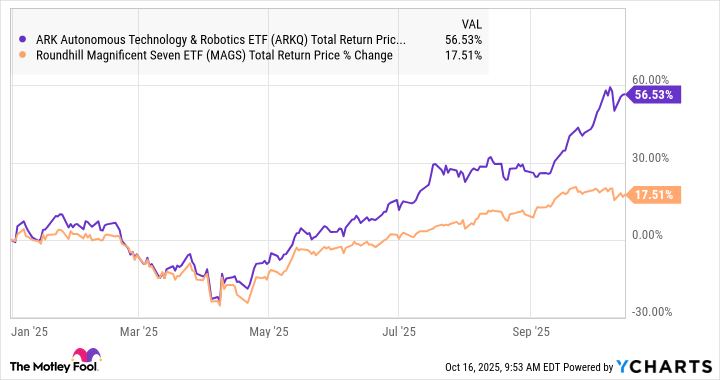The "Magnificent Seven" stocks have delivered a total return of approximately 18% through mid-October, based on the performance of the Roundhill Magnificent Seven ETF (MAGS +0.01%). Although this isn't as impressive as the stellar 64% gain the collection of mega-cap tech stocks posted in 2024, it's still a strong performance over a period of less than a year.
However, this return pales in comparison to that of the Ark Autonomous Technology & Robotics ETF (ARKQ 1.14%), an actively managed ETF led by notable tech investor Cathie Wood. The fund, which focuses on things like artificial intelligence, robotics, autonomous vehicles, and other major technology trends, has gained 56% so far in 2025.

Image source: Getty Images.
There's a solid case to be made that the ETF is still a smart buy for long-term investors right now. Here's why the Ark Autonomous Technology & Robotics ETF has performed so well, and why it could still be worth a look for investors who want an outside-the-box approach to AI and robotics investment.
ARKQ Total Return Price data by YCharts
A different approach to AI investing
The majority of ETFs that focus on AI and technology are heavily weighted toward mega-cap tech stocks like those in the Magnificent Seven. But not only is the Ark Autonomous Technology & Robotics ETF an actively managed ETF, but Cathie Wood and her team actively seek outside-the-box opportunities that many investors overlook.
To be fair, the fund's largest holding is Tesla (TSLA 1.85%), which is a Magnificent Seven stock. But beyond that, the rest of the top five is Kratos Defense & Security Solutions (KTOS 6.65%), Teradyne (TER +3.52%), Rocket Lab USA (RKLB 7.47%), and Archer Aviation (ACHR 1.95%). Some of the other Magnificent Seven components are owned by the fund but aren't among the largest investments -- for example, Amazon.com (AMZN +1.60%) and Nvidia (NVDA 2.89%) are the fund's No. 13 and No. 15 stocks, respectively, in a portfolio of only 36 companies.
Why has the Ark Autonomous Technology & Robotics ETF beaten the ETF tracking the Magnificent Seven?
The short explanation is that some of the fund's largest holdings have delivered excellent returns so far in 2025. Kratos and Rocket Lab are up by 239% and 162%, respectively, for the year as of this writing. Palantir (PLTR +1.03%), the ETF's sixth-largest investment, is higher by 134%.
I could go on, but you get the idea. Not all of the stocks in the Ark Autonomous Technology & Robotics ETF have delivered market-beating performance this year, but a good number of the fund's stocks are up by triple digits.
To be thorough, the Ark Autonomous Technology & Robotics ETF has a 0.75% expense ratio, which is certainly higher than you'll find from many index ETFs. This means that for every $1,000 in assets, you're paying the fund managers $7.50 per year. However, it is on par with what other AI-focused ETFs charge, and the recent performance speaks for itself. Note: This isn't a fee you pay -- it will simply be reflected in the ETF's performance over time.
An ETF worth looking into
If you're looking for a way to get exposure to artificial intelligence as well as some other exciting tech trends in the market, but you don't necessarily want to invest in the mega caps, the Ark Autonomous Technology & Robotics ETF could be worth a look. It is full of high-potential companies and although it has outperformed this year, there's a lot of upside potential if its major holdings can execute on their respective growth strategies.
















